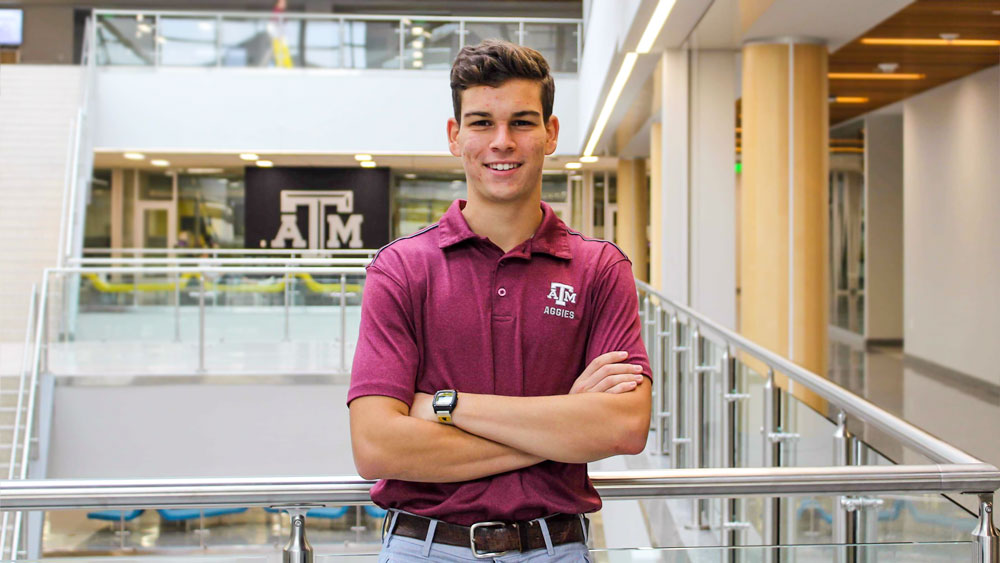
“When I moved, I didn't speak a word of English,” Sebastiao Appleton Figueira, a sophomore in the Department of Ocean Engineering at Texas A&M University, said. “I thought I'd learned English at school, but it's the same thing as learning Spanish in elementary school. If you try to go to Spain with that knowledge, nothing's going to happen.”
Figueira, born and raised in Portugal, moved to the United States with his family when he was in middle school.
“On my first day, two weeks late into the school year, I went to my school,” he said. “They handed me a polo and said, ‘Put this on, this is the uniform.’ I couldn’t understand a single word that was written on my schedule. I had no clue what any of it meant. They put me in my first class, opened the door, pushed me in and closed the door behind me. And that's how my education in the United States began.”
For the next three months, Figueira copied down his homework assignments, letter by letter, and then translated it to Portuguese to complete it. With the help of his parents, he translated it back to English and took it to school to turn it in the next day. By the end of it, he was fluent in English.
This persistence and drive followed him through high school, where he took a multitude of AP exams in preparation for his college career.
“I wanted to go to California (for university),” Figueira said. “That was my dream, but I came to Texas A&M and fell in love with the school completely. Every little tradition, everything's been my passion since.”
Coming from a largely coastal country and a family with naval and engineering roots, Figueira found a home away from home in the ocean engineering department – drawn to it by the versatility of the application a degree would offer him.
“I could explore anything from renewable energy to ship manufacturing, naval architecture, even some electrical design. That’s all included here,” he said. “And then just the prospect of what is to come in the future. Ocean levels are rising. The United States has not started planning for that as much as other countries have. And, so, being part of a small group in the workforce that actually has the knowledge to solve those problems, and knowing that I'm going to be one of the most prepared to do so through this program makes me extremely excited.”
As Figueira explained, being part of a department that not only has industry connections and expert instructors, but also a tight-knit community of faculty and students has allowed him to become friends with his fellow classmates quicker. So much so that he is planning on participating in a departmental study abroad with a group of close friends next summer.
Along with diving into the department’s Human Powered Submarine Project and branch of the Marine Technology Society, Figueira is also a recent inductee into the Zachry Leadership Program (ZLP), a mentor in Freshmen Reaching Excellence in Engineering, a sub-team lead for the Engineers Without Borders campus chapter and a Fish Camp counselor.
This year, his Fish Camp experience hit close to home, as he worked Session G – the last camp of the summer dedicated to out-of-state and international students. As such, he was able to give those who are coming from a background similar to his own a few words of advice.
“You are not going to look any different than anyone else while you're on campus. It is going to be a struggle to deal with all the extra paperwork, all the extra meetings that no one knows about, all the extra things that you have to deal with that stay in the dark. But the thing is, nothing will ever stop you from pushing to be involved. And my counsel to anybody who comes to Texas A&M – international (student) or not – is to dive in headfirst. Texas A&M has proven to give me as much as I put in. Don't give in and don't give up. Keep pushing forward.”
And, for those who are trying to find their major, Figueira encourages his peers and fellow students to consider the ocean engineering department – hoping to help people share in his experiences.
“Don't give in on the program because it's small; the opportunity that comes from it is so much bigger than that,” he said. “Don't shut it down because it's new. We have fantastic professors and a really fantastic program. The community that you're going to find here is putting their all in for their own growth and for the growth of the program and, therefore, your growth. Do it. There's no reason not to.”